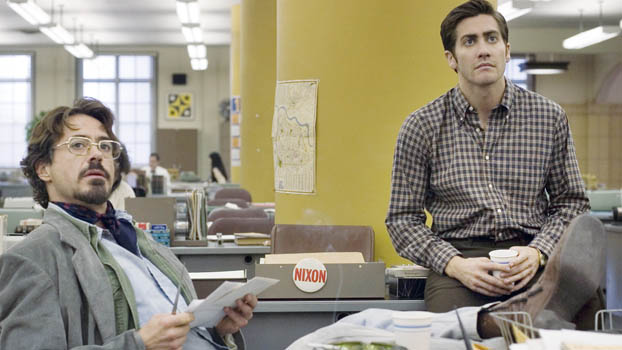Zodiac

Peter Bradshaw
The look and the feel and the bulk of David Fincher's new movie are so seductive. He has made a massively confident and watchable thriller about the unsolved "Zodiac" murders in 1960s San Francisco: the work of a serial killer who sent teasing codes and letters to the local papers, and who is today either dead or still at large, preparing to resume his career.
This was a man who would lay low for months or years between his bloody crimes, while his pursuers - cops, reporters - grew older and more careworn as their own careers unwound. Zodiac spans a 30-year period to the early 1990s: an epic, tangled saga of leads muddled, evidence lost and areas of jurisdiction haggled over. The murder scenes are chilling, counterpointed by the stolid procedural work and the rich background settings. Fincher's period material is outstanding; the colours of the San Francisco bay look ravishing in images that seem plucked from Hitchcock's Vertigo, and at one point there is a lovely (and presumably digital) stop-motion historical sequence, recreating the construction of the city's Trans-america Pyramid.
Robert Downey Jr and Jake Gyllenhaal play two shirtsleeved journalists who are on Zodiac's case: Downey is Paul Avery, the mercurial crime reporter who dresses like a wrecked aesthete - a sozzled stew of Jimmy Breslin and Oscar Wilde. Gyllenhaal is Robert Graysmith, the paper's geeky and little-loved cartoonist whose amateur enthusiasm for the case becomes an obsession. Their work alternately helps and hinders the investigating officers, Inspectors David Toschi (Mark Ruffalo) and William Armstrong (Anthony Edwards).
Our coffee-drinking odd couple do a fair bit of tense perching on each other's desks in the open-plan 60s newsroom, at one stage looking up together in an image used in the picture's publicity stills. Fincher is here surely recalling the most dynamic duo of the period: Woodward and Bernstein. But who is to be their Deep Throat? It can only be Zodiac himself, getting in touch with his misogynistic rants, crazy codes and creepy clues.
Zodiac is very different from Fincher's other serial-killer film Seven. That was in the classical serial-killer genre, in which the culprit has a cogent, unified short-range career, conducted within a limited time-frame, leading to a clear unmasking, if not capture. This movie is quite different: Zodiac's victims are not governed by, say, the 12 astrological signs. They are just random, anarchic. His story has no clear ending and so clearly belongs to that other genre of muddled, messy, unreadable real life. It is narrated from the investigator's perspective, but in its elusive sprawl, it is comparable to killer's-eye-view -movies such as Shohei Imamura's Vengeance Is Mine, Cédric Kahn's Roberto Succo or Jaime Rosales' The Hours of the Day. Those were about serial killers who are doing something other than serial-killing for large amounts of screen time: serial killers plugging away at the day job. The killer can muddle along for years without his career coming to any sort of crisis; it may not even be clear to him that he is a "serial killer" in the generally accepted sense of the term.
As his murders tail off, or are attributed to other wackos, Zodiac himself seems like a once-praised but now misunderstood artist who has mysteriously neglected or even abandoned his vocation. In failing to nail him, the wearied cops and newspapermen are like critics who have not delivered a definitive appreciation of his genius.
It is impossible not to enjoy Zodiac: if enjoy is the word for a picture so often scary and stomach-turning. And it certainly isn't boring, despite a mammoth two-and-a-half hour running time. Fincher's feel for detail is terrific: the chewed pencils, typewriters and clunky tele-fax machines are very real, and there are some bizarre moments so absurd that they could only have come from real life, such as the conceited TV psychologist Melvin Belli (Brian Cox) taking a call on live TV from a heavy-breathing weirdo claiming to be Zodiac, and arranging a "secret" rendezvous with him at a location actually revealed on the air: with the inevitable media-cop scrum as squad cars and TV vans scream through the streets to this top-secret address.
Gyllenhaal and Downey's performances are arguably a little opaque, and Downey plays the dialogue in his trademark swallowed gabble, which is now verging on self-parody. Ruffalo, too, is in danger of getting typecast as the cop, and there is a tricky moment in which his character is taken off the case on the grounds that he forged some Zodiac letters released to the press. Nothing in Ruffalo's plain-dealing performance casts any light on the vanity or delusion that must have been behind this baffling professional lapse.
Maybe there's no sense to be made of this unwieldy, unlovely, downbeat story. But there's no doubting Fincher's ambition and sheer cinematic virility.




